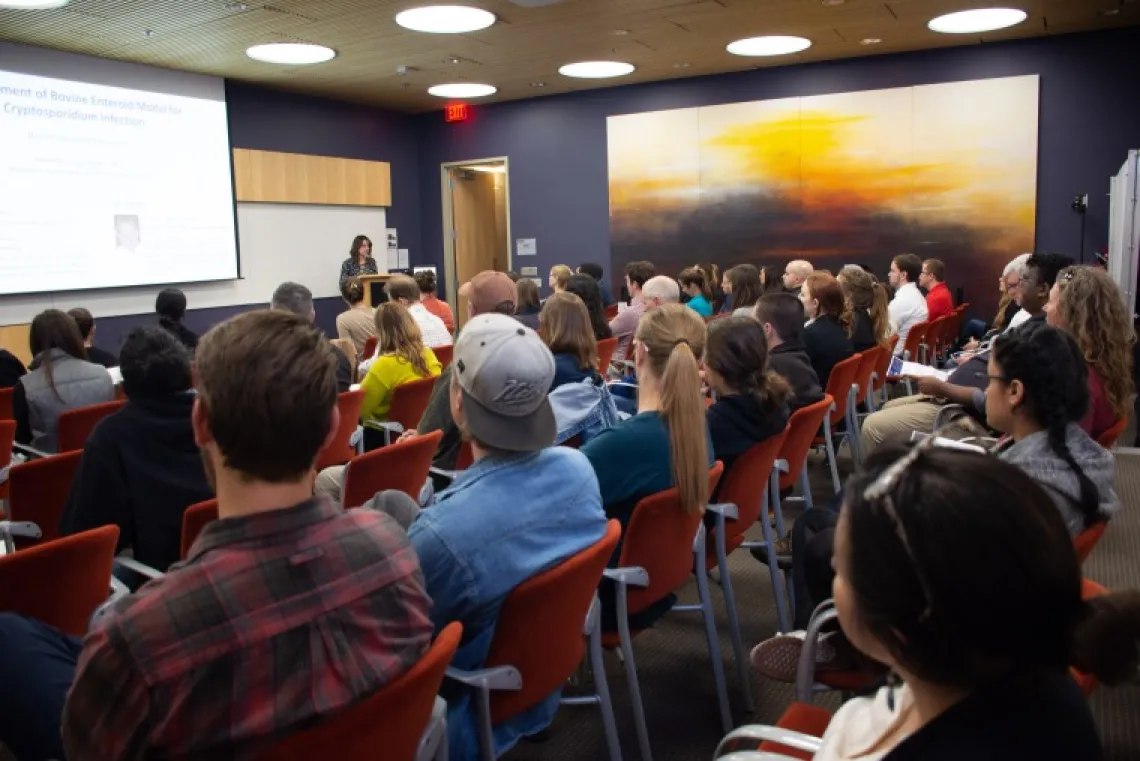BIO5 Postdoctoral Fellowship serves as catalyst for esteemed USDA award
The BIO5 Postdoctoral Fellowship provided Jennifer Lising Roxas with a steppingstone to attain a two-year USDA fellowship award that funds her salary, research and travel to professional development opportunities.

Deanna Sanchez, BIO5 Institute
Created by Michael D.L. Johnson, assistant professor in the Department of Immunobiology and member of the BIO5 Institute, with the support of BIO5 Institute leadership in 2019, the annual BIO5 Postdoctoral Fellowship provides exceptional scholars with monetary awards and mentorship to jumpstart their careers as competitive candidates for future awards, grants and positions.
One example is Jennifer Lising Roxas, a postdoctoral fellow in the laboratory of Gayatri Vedantam, professor of immunobiology and animal and comparative biomedical sciences and BIO5 member, who used the fellowship as a launching point for additional awards. Due to her strong record of accomplishment, Roxas recently received a two-year USDA NIFA Postdoctoral Fellowship to further study Cryptosporidium, a microscopic parasite that causes diarrheal disease in humans and other animals.
“I’m just thrilled for her,” Vedantam said. “She’s come at this process with so much thought and reflection. I just couldn’t be more proud.”
Infections with Cryptosporidium, or Crypto, are the leading cause of water-borne diseases among humans in the US. The parasite is often transmitted at daycare facilities and public swimming pools, and infection leads to severe diarrhea which can have life-threatening consequences, especially in immunocompromised patients. Crypto is the second leading cause of infectious diarrhea in children, and it is also the leading cause of diarrhea-related death in neonatal calves.
There are currently no vaccines for human infection. According to Crypto expert and Roxas' collaborating mentor Michael Riggs, professor in the School of Animal and Comparative Biomedical Sciences, the current treatment option is both expensive and lacking efficacy, as it minimally reduces length of disease. Crypto is also resilient to environmental insults such as drought and high heat, as well as manmade chlorine-based products. Thus, methods to prevent and treat Crypto infections in humans and animals are desperately needed, but tools to study the parasite are sparse.
To acquire resources to develop these tools and advance her career, Roxas desired to obtain funding through several grants. At the time of her USDA application, Roxas was the recipient of the Sursum Postdoctoral Fellowship, a UArizona Postdoctoral Research Development Grant that fosters independence and advances the career goals of postdoctoral scholars. Despite her impressive record of accomplishment of manuscript writing and project completion, Roxas said the USDA grant reviewers were hesitant about her lack of grant writing experience.
Given the chance to address their comments, Roxas explained she was previously unable to apply to other national grants because of her former non-immigrant status. However, shortly after submitting her application to the USDA, Roxas was awarded the BIO5 Postdoctoral Fellowship, demonstrating her grant writing prowess to the reviewers.
“The BIO5 grant really helped me to address their comments because it was able to show I am competitive and able to earn grant awards,” Roxas said.
She also attributed her grant-writing development to her mentors Vedantam and VK Viswanathan, also a professor of animal and comparative biomedical sciences and BIO5 member, who both serve on panels for pre- and postdoctoral grants and could therefore provide Roxas with guidance. In addition, Roxas further developed her grantsmanship by helping Vedantam with her own submissions.
Roxas’ continued efforts to advance her grant writing experience, including her successful BIO5 Fellowship, secured her USDA fellowship. She will be awarded $165K over the next two years to supplement her salary, purchase research supplies and attend professional development conferences.
Using her experiences to help others succeed in their own endeavors, Roxas has volunteered to mentor graduate students in Vedantam’s critical thinking graduate course.
“Jenny has an enormous generosity of spirit,” Vedantam said. “Out of everything she thinks and does, sharing is really at the top of her list.”
Having studied the mechanisms of Crypto infection as a BIO5 Postdoctoral Fellow, Roxas aims to use her new award to develop tools to prevent infection altogether. By combining her background in proteomics with Vedantam’s expertise in probiotics, Roxas will create a probiotic strain of bacteria that inhabits the same intestinal niche as Crypto. Given as a supplement to the newborn calf, the probiotic is expected to outcompete Crypto for the same space in the gut, thereby preventing infection.
Roxas also hypothesizes that the probiotic could be used like a vaccine, and if given to pregnant cows, might be able to produce hyperimmune colostrum - the antibody-rich mammary gland secretion following birth - for passive immunity in the newborn calves.
In line with the interdisciplinary nature of the BIO5 Institute, Roxas says her work is truly a collaborative effort. Not only does she draw upon the techniques she learned from both Vedantam and Viswanathan, but she attributes much of her methods to study Crypto to her third mentor, Riggs. According to Roxas, Riggs is a “world-renowned expert in Crypto research” and has pioneered many of the research tools and infection models used to study the parasite.
In addition to studying Crypto, Roxas directs the production of hand sanitizer for Arizona health care workers amid the COVID-19 pandemic. According to Vedantam, Roxas’ leadership has enabled the team to scale up from producing just 100 bottles of sanitizer in March to now more than 30,000 bottles.
Roxas plans to build a career determining the ways in which different intestinal pathogens cause life-threatening illnesses as an independent university research professor. Thanks to her BIO5 and USDA Postdoctoral Fellowships, Roxas aims to launch her career in a few years.
“Jenny has really embraced this career path,” Vedantam said. “She has made the decision very thoughtfully, and she is really trying to get the robust skillset to get where she wants to be.”
“Thank goodness for these seed grants,” Riggs added. “They’re all it takes to get someone’s career launched. There’s no question in my mind Dr. Roxas will soon be a rising star in Crypto research.”
